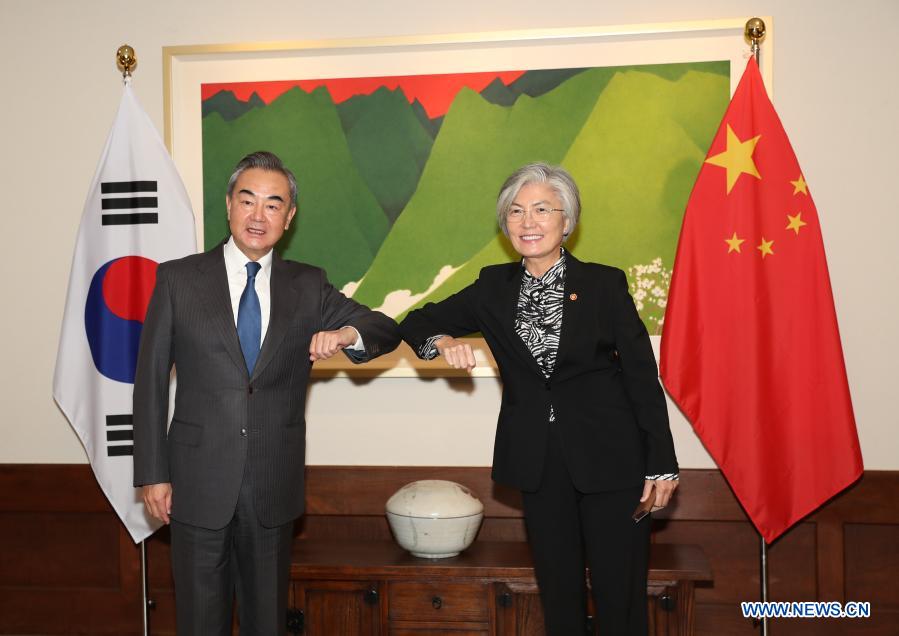Abstract : China and South Korea should enhance cooperation in fighting the COVID-19 pandemic, further develop bilateral ties and strengthen multilateral coordination and cooperation, visiting Chinese State Councilor and Foreign Minister Wang Yi said here on Thursday.

Visiting Chinese State Councilor and Foreign Minister Wang Yi touches elbows with South Korean Foreign Minister Kang Kyung-wha after their talks in Seoul, South Korea, Nov. 26, 2020. (Xinhua/Wang Jingqiang)
SEOUL, Nov. 26 (Xinhua) — China and South Korea should enhance cooperation in fighting the COVID-19 pandemic, further develop bilateral ties and strengthen multilateral coordination and cooperation, visiting Chinese State Councilor and Foreign Minister Wang Yi said here on Thursday.
Wang, who arrived here late on Wednesday, made the remarks at a meeting with South Korean Foreign Minister Kang Kyung-wha during his three-day visit to South Korea.
Kang, for her part, said that the South Korea-China strategic cooperative partnership has maintained positive development momentum in recent years. Both countries have worked hand in hand to combat COVID-19, setting a good example for the international community.
South Korea is looking forward to strengthening communication and coordination with China on issues such as addressing climate change, upholding multilateralism and free trade, she added.
During the meeting, China and South Korea agreed that under the strategic guidance of the two leaders, both countries should strengthen communication and exchanges, enhance friendship and mutual trust, deepen practical cooperation so as to elevate China-South Korea strategic cooperative partnership to a higher level, according to the Chinese foreign ministry.
Both sides agreed to strengthen joint prevention and control of COVID-19, improve and gradually expand the application of the “fast-track” entry and promote building the anti-epidemic cooperation mechanism in Northeast Asia.
Both sides agreed to establish a committee for future development of China-South Korea relations and map out a plan for developing the bilateral ties for the next 30 years as the year of 2022 marks the 30th anniversary of the establishment of diplomatic ties between China and South Korea.
Both sides agreed to launch China-South Korea “2+2” dialogue on diplomacy and security, launch China-South Korea dialogue on maritime affairs and hold a new round of high-level strategic dialogue between foreign ministries of China and South Korea.
Both sides agreed to launch the Year of Cultural Exchange between China and South Korea in 2021 and 2022 and make preparations for celebrating the 30th anniversary of the establishment of diplomatic ties between the two countries.
Both sides agreed to accelerate the docking of the Belt and Road Initiative (BRI) with South Korea’s development strategies, push forward cooperation in third-party market, and strengthen cooperation in such key areas as emerging industries.
Both sides agreed to conclude the second phase of China-South Korea free trade agreement as soon as possible, issue the Joint Plan for China-South Korea Economic and Trade Cooperation (2021-2025) at an early date in a bid to create better conditions for bilateral economic and trade cooperation.
Both sides agreed to support each other in hosting Beijing Winter Olympic Games and Gangwon Winter Youth Olympics and further step up people-to-people exchanges after the pandemic is brought under effective control.
Both sides agreed to work together to maintain peace and stability on the Korean Peninsula and advance the political settlement process of the Korean Peninsula issue. China firmly supports both Koreas in improving relations and promoting reconciliation and cooperation.
Both sides agreed to work with the Japanese side to positively push forward the negotiations of China-Japan-South Korea free trade agreement. China supports South Korea in hosting the 9th China-Japan-ROK (Republic of Korea) leaders’ meeting.
Both sides agreed to work jointly for an early entry into force of the Regional Comprehensive Economic Partnership Agreement, safeguard multilateralism and free trade, promote building an open world economy and join hands in tackling global challenges such as climate change. Enditem
About Xinhua Silk Road
Xinhua Silk Road (en.imsilkroad.com) is the Belt and Road Initiative (BRI) portal.China’s silk road economic belt and the 21st century maritime silk road website,includes BRI Policy, BRI Trade, BRI Investment, Belt and Road weekly, Know Belt and Road, and the integrated information services for the Belt and Road Initiative (BRI).
Source: China, South Korea reach consensuses on anti-epidemic effort, all-round cooperation
Comments
Post a Comment